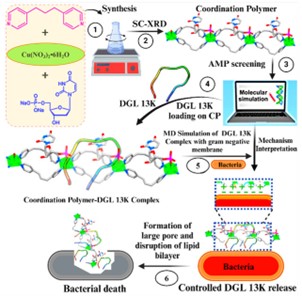Antibiotic resistance is a growing global health threat. Traditional antibiotics are becoming less effective, and there’s an urgent need for new strategies to fight infections, especially those caused by drug-resistant bacteria (gram-negative). The study was conducted by a team of Muhammad Irfan, Beijing Institute of Technology, Beijing, China, Hui Li, Beijing Institute of Technology, Beijing, China, and colleagues.
The researchers developed the {[Cu(dUMP)(dpp)₂]·3(H₂O)·(NO₃)}ₙ coordination complex (CP-1) combining Cu(II) ions with deoxyuridine monophosphate (dUMP), a bioactive nucleotide, and 1,3-di(4-pyridyl)propane (dpp), a flexible N-donor linker, under mild conditions. It was examined to explore its use as a drug delivery vehicle for antimicrobial peptides (AMPs). By integrating AMPs with coordination polymers, the system enhances antibacterial activity, stability, and selectivity while reducing toxicity and resistance. This approach aligns with current strategies for combating drug-resistant infections and supports the use of CPs in targeted, membrane-active therapies.
This work opens the door to next-generation antimicrobial materials that are more effective and longer-lasting. The coordination polymer acts as a carrier and protector for the AMP, improving its performance in biological environments. Future research could explore different peptides and metal ions, or adapt the system for targeted drug delivery or wound healing applications.
- Coordination Polymer Carrying Antimicrobial Peptide for Enhanced Anti-Infective Therapy
Madiha Saqlain, Hafiz Muhammad Zohaib, Dilawar Akram, Samina Qamar, Iqra Tabassum, Muhammad Irfan, Hui Li
ChemBioChem 2025
https://doi.org/10.1002/cbic.202500286
